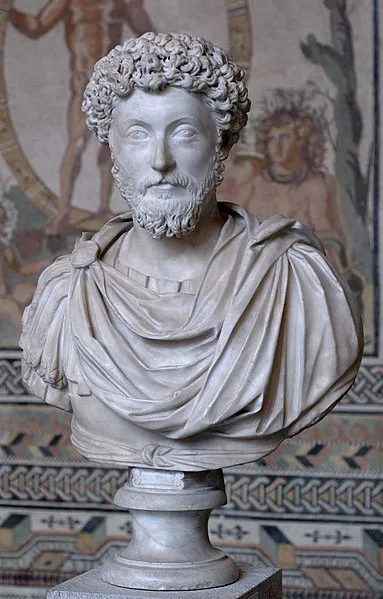Hey guys,
If for some reason you happened to read my steemit account page maybe it occurred to you that I have cited a quote of Marcus Aurelius on there:
It is not death that a man should fear, but he should fear never beginning to live.
- Marcus Aurelius, Meditations
But what does this mean and who is this guy anyway? Well let me give you a short introduction.

As a matter of fact I am rather philosophically interested -not professionally but at least casually- and quite fond of classical works on ethics and practical philosophy ranging from antiquity to modern times. Judging from a historical perspective it is hard not to acknowledge the hellenistic philosophy in particular for constituting the foundation for the entire cultural hemisphere of the western world after all.
And as it turns out, in many people's opinion Marcus Aurelius represents the most famous adherent or even the pinnacle of one of the major (and my favourite) schools of hellenistic philosophy - the so-called stoicism.
The origins
Nowadays we know stoicism mainly by its connotation as a feature of character such as one might use the tem stoic to describe an indifferent and emotionless attitude but this hardly does stoicism's philosophical legacy justice.
Contrary to abstract and metaphysical aspects of many schools of thought stoicism has since its very inception always been focussed on applying logic and reasoning to derive practical ethics. It all began in the earliest days of western culture itself in ancient Greece when pensive people facing the usual burdens of their time gathered to discuss and asked the question of how to achieve a good life.
Not surprisingly not all adherents of stoicism were 'professional' philosophers first and foremost but 'ordinary' people coming from diverse origins unified by their contemplation about the good life and the existential struggles of mankind. Reflections about the pursuit of happiness or self-determination in the face of fate are almost defining concepts of stoicism and at the heart of many famous thinkers who contributed to this discipline.
Their philosophical lineage extends somewhat irregularily from antiquity to present with a strong focus on the greco-roman period and probably the most influential authors being:
- Zeno of Citium was a greek merchant who met and discussed with his students at the stoa (covered walkway) on the agora (public/market place) of Athens. This is how the name stoicism originated.
- Seneca the Younger was a famous Roman statesman, author and playwright.
- Epictetus was a slave born Greek who eventually taught philosophy in Rome, founded a philosophical school and became a friend of emperor Hadrian.
- Marcus Aurelius was the last 'good' Roman emperor before the Imperium Romanum fell into political instability and eventual decline.
- Arthur Schopenhauer and Friedrich Nietzsche are two of the most important German philosophers who -although not exclusively stoic- iterated and developed integral stoic ideas on freedom of will and embracing fate.
- ...
Marcus Aurelius is often consired as the stoic philosopher because not only was he one of his kind from the creatively fertile greco-roman period and he aggregated thoughts of his predecessors in his seminal work "Meditations", but also he upheld many philosophical ideals and philantropy in general during his time as emperor granting him the reputation of a 'philosopher king'. In fact his reign fell into a politically turbulent time with Aurelius spending his last decades almost exclusively in field camps along the empires easten border in defensive military campaigns against the Parthians and various Germanic tribes where he also wrote his works.
The essence of stoicism
When it comes to practical ethics, the quintessence of stoicism mostly boils down to 3 important principles which one should strive for:
- Perception: maintaining a presence of mind to clearly and objectively perceive the world around us
- Will: accepting the fate, external factors and things we can't change as given conditions without unfruitful regret, fear, despair and so on
- Action: taking action and changing the things we can change starting with but not being limited to our own view of the world
Being stoic does not mean being emotionless but on the contrary stoics argued that following these guidelines in a measured, rational way would be the only reliable path to cultivate joy and happiness. Their reasoning is that to achieve peace of mind one should discard emotional disturbances that arise from contemplating about something that is beyond one's control.
To me this epitomizes almost timeless rules for practical ethics that can be just as applicable today as they were in the past. And this is also the reason for me to write about this topic in general. Anyone can have an existential crisis from time to time and it is reassuring to know that many clever people in history have already come up with very refined thoughts that can also help us to face the challenges of modern time.
So what does Marcus Aurelius advise in his quote from above? It is a aspect of what I've just told you:
In the end death is just as inevitable and natural as birth which is why there is no use in fearing it. But making the most of the time given to us is an endeavour that we can and should aim for. Failing to do so is something we have to fear...
In that spirit:
Thanks for reading and a Happy New Year to you all! (I know I'm a bit late)